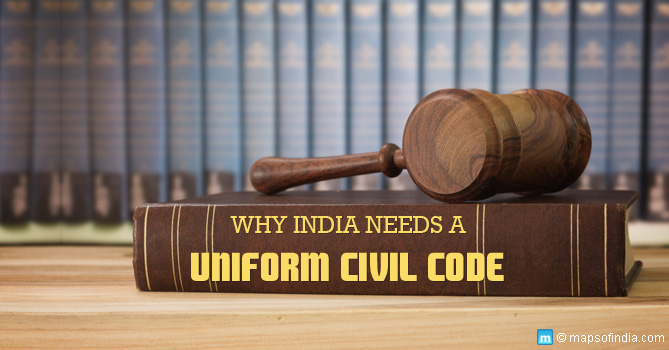The Government of India has recently asked Law Commission to take a look at the Uniform Civil Code and analyse whether of not it can be implemented. It is expected that this issue will soon start a debate – a heated, political one at that – and it could have really far-reaching consequences. The Uniform Civil Code has always been a controversial one given the political and religious fabric of India, and this occasion also marks a first where the government has asked Law Commission – which plays an important role in any legal reform in India – for its counsel and advisement.
What does the Uniform Civil Code imply?
Having a Uniform Civil Code means that the same set of personal laws apply to all civilians irrespective of their religion. As things stand now, the personal laws are different for Hindus and Muslims. Personal laws deal with areas such as property, succession and inheritance, and divorce and marriage.
Debate over the years
Over the years, debate on this law has been rather fervent and it has always been related in one way or the other to issues such as secularism. As may be expected, the advocates and the opponents of this code have put forward varied interpretations of the possible religious and social effects of implementing these laws.
Supporters and opponents
BJP has always been a major advocate of implementing this code whereas Congress has been hostile. This debate has also seen Hindus and Muslims on the opposing sides of the fence.
What has the government done?
Certain officers, who know much about the matter, have stated that law ministry has asked for a detailed report from Law Commission regarding the subject. The ministry is also supposed to have sent documents about case laws that are in operation right now. There are also some documents that contain discussions related to case laws regarding Uniform Civil Code.
What will Law Commission do?
Law Commission is expected to discuss the matter with all the stakeholders and experts and then submit its report. It is presently being led by Balbir Singh Chauhan, a retired judge of Supreme Court. As per Article 44 of Directive Principles, Indian Constitution, the state is supposed to implement Uniform Civil Code.
Shah Bano Case
Ever since the Shah Bano Case, which took place in 1985, Uniform Civil Code has been a talking point in Indian politics. At that time Supreme Court had ruled that Bano’s former husband should provide her alimony. More importantly, the apex court of India had also stated that Uniform Civil Code should be implemented. In what could be seen as a controversial decision, the-then Indian government, led by Rajiv Gandhi, had attempted to pass a law in parliament in opposition to Supreme Court’s ruling.
What is the government thinking?
Sadananda Gowda, the union law minister, has recently said in an interview regarding Uniform Civil Code that they had to assess its impact on national integration. He has also stated that the process will take quite some time since there are different kinds of personal laws all around the country. He has also talked about the emotions, rituals, and customs attached to the whole issue. Perhaps implying that it might be long before a conclusion, which is agreeable to all, can be reached. Gowda also feels that slow and steady steps will soon be in order in the context of this particular issue.
Triple “talaaq”
Recently, several Muslim ladies had launched a campaign against triple
“talaaq” (Arabic word for Divorce) – a practice where a man divorces his wife by way of pronouncing the phrase. This campaign had also brought to public notice the lack of a common civil code applicable to all the peoples in India.
History of Uniform Civil Code
It’s believed that when the Constitution of India was written there had been plenty of debate over the issue, but there was no concrete outcome. Eventually a compromise was reached and Uniform Civil Code became only a directive principle. However, this compromise was severely objected to by several members of Constituent Assembly such as Minoo Masani, Rajkumari Amrit Kaur, and Hansa Mehta. Kaur had in fact stated that the religion-based personal laws were creating divisions within the country by compartmentalizing various aspects of life and thus stopping India from becoming a nation.
Later on, during the first 10 years of Independence, Indian government passed Hindu Code Bill in spite of staunch opposition from conservative Hindus. However, they could not do the same with Muslims since they felt that they were still recovering from the trauma of Partition and thus there was no need to engage them in a negative manner and change their personal laws. According to people who support Uniform Civil Code, this was a mistake that they made.
What are the proponents saying?
According to the supporters of implementation of Uniform Civil Code, there are two major reasons as to why it should be done. With Modi administration asking Law Commission to look into possible implementation of the same, they are hopeful that finally the code, which has been in limbo for such a long time, would be pressed into action. The supporters are saying that because India is supposed to be a secular republic, all its citizens should be subject to the same laws. They don’t buy into the concept of different laws for people with differing religious affiliations.
They also feel that for years the rights of women have been limited because of religious laws. With a Uniform Civil Code that may not be the case any more. They have pointed to the fact that Shah Bano Case is not the only one where the judiciary called for Uniform Civil Code – there were some other major cases as well where similar rulings were awarded. The supporters of Uniform Civil Code also state that BR Ambedkar had championed the cause of Hindu Code Bill because he saw it as an opportunity to provide more power to women. Hamid Dalwai, a noted Islamic social reformer, also supported the Code and a major component of his campaign was greater rights for women.





